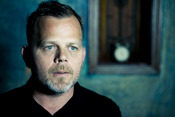Music |
Matthew Ryan
By
Published: Sep 21, 2011
Category:
Rock
It was the summer we were living in Paris. The early evening was sunny and warm, and I had a business dinner a mile down the Seine, so I walked. For company, I had my iPod. I plugged in my professional-grade headphones, dialed up Matthew Ryan’s most recent CD, “Regret Over the Wires,” and started walking.
And now we come to Matthew Ryan’s new release, “I Recall Standing As Though Nothing Could Fall.” Like all of his work, it’s bristling with ideas and a point of view. Try these lyrics:
An artist who writes like a poet, sings like a ghost and makes music you can’t shake — I always want to talk to that person. So Matthew and I had one of our periodic phone calls.
Before we began the dance of the formal interview, we compared our present states of mind. We agreed that we were “frustrated,” then he began to speak of “a confluence of paralyzing elements.” That was too good to leave in the green room, so we started there.
Jesse Kornbluth: How much of this frustration is already — and literally — on the record?
Matthew Ryan: For a number of years, as anyone familiar with my work knows, I haven’t hesitated to say what I meant — but even then I felt I was still holding back. Particularly on social and cultural issues. This time I pulled no punches. It’s a liberating album.
JK: Is there a theme that runs through these songs?
MR: Man vs. himself — the root of many of our trouble these days.
JK: One of the great themes.
MR: One of the three great themes in literature. Man vs. the world, man vs. himself, and man vs nature. Heady stuff, I know, but it feels as if we are at an inflection point. It feels like we’re speeding toward a cliff, but no one wants to talk about it. Well, I do.
JK: What’s the positive message?
MR: I believe the future is still ours to define if we engage more honestly and persistently with ourselves, each other, our governments. It can be more equitable, more beautiful.
JK: How much does having kids influence this?
MR: I’ve always had a large lake of empathy, but having kids has deepened it. I want them to live in a world that doesn’t lean so lamely on bombs and bullets and divisions.
JK: Am I correct to link your song “Hey, Kid” to the don’t-kill-yourself-gay-kids campaign called “It Gets Better?”
MR: No connection really, but a struggle is a struggle. I can’t imagine what it’s like for younger people in this post 9/11 world. We’re living through a dark period, but they’re not inherently dark. It doesn’t have to be like this.
JK: What happens when you play these songs in front of people?
MR: Admittedly it can be mixed at times. But more often than not I feel a sense of relief, a sense of quiet — they seem inspired someone is saying these things. And that’s as I would hope, because these are songs about perseverance and self-reclamation.
JK: Strip away the words. Describe the music.
MR: It’s a small band with a big sound. It’s like this: Sometimes you walk down a street and there’s no cinema, life is flat and dull. Then you turn a corner and something strikes you — something in the light, or the vibe, or the way a block glows. It can be any little thing, beauty and honesty can shake you awake with its simplicity. That’s what I want this music to do.
JK: I think of you as Chopin with a backbeat.
MR: If only.
BONUS VIDEOS


